Napolitan, a pasta dish that has uniquely evolved in Japan, offers a mellow flavor from ketchup combined with the chewy texture of spaghetti. While the combination of ketchup and spaghetti may seem unconventional, it works surprisingly well, resulting in a harmonious dish.
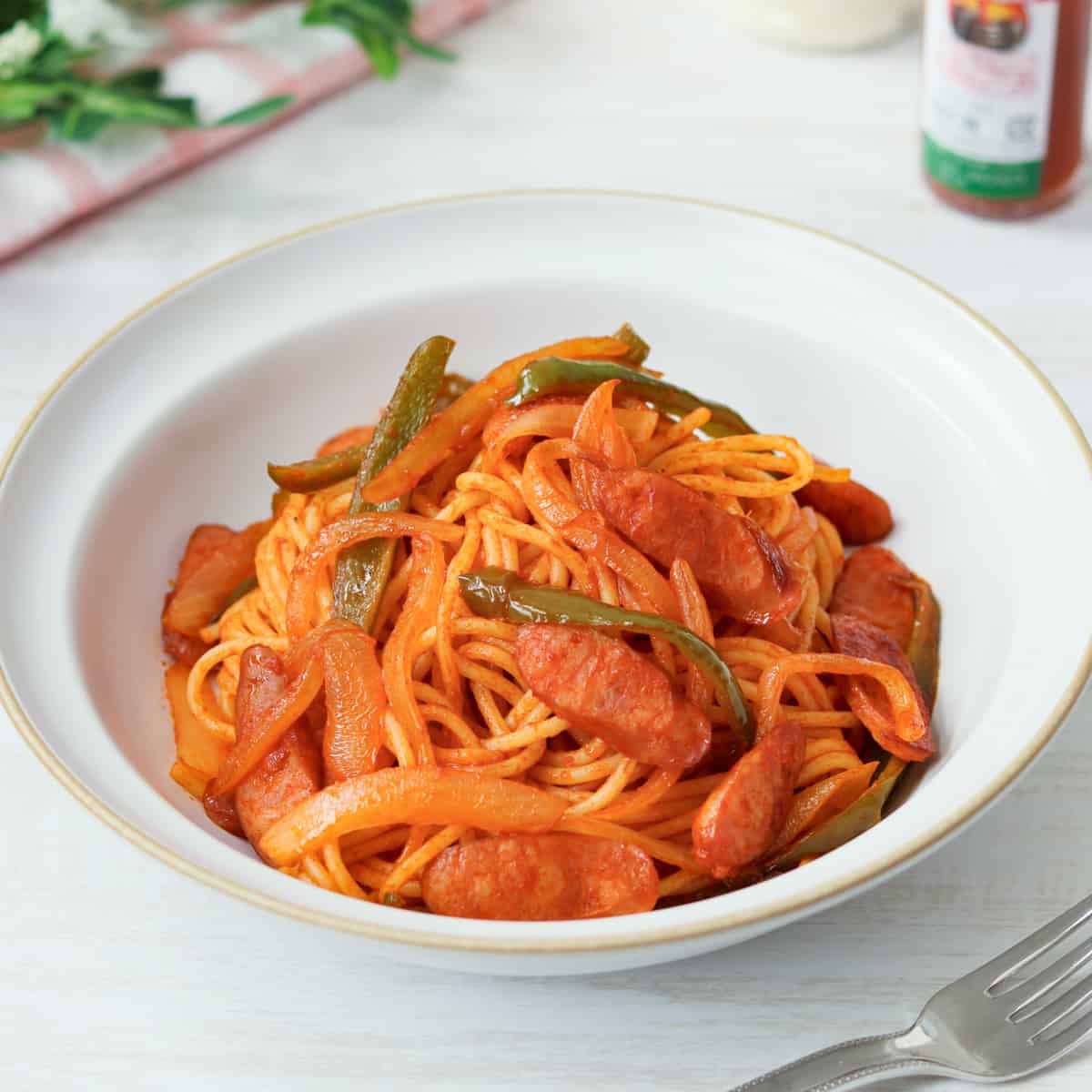
Jump to:
What is Napolitan (Naporitan)?
Napolitan is a Japanese pasta dish inspired by Italian cuisine. It consists of spaghetti that is boiled a little longer than usual, tossed with sautéed ingredients such as onions, green bell peppers, and sausages, and seasoned with ketchup.
The term "Napolitan" is a Japanese-made English word meaning "Naples-style," and it is sometimes spelled as "Napo'r'itan" because Japanese doesn't distinguish between the "R" and "L" sounds. It is an Italian-inspired Japanese dish that has been beloved at old-fashioned coffee shops across Japan as a classic menu item.
What makes this dish distinctive is the use of ketchup for seasoning and the soft, chewy texture of the spaghetti. Cooking the ketchup brings out a mellow flavor with a hint of acidity, while boiling the spaghetti slightly longer creates a satisfying texture and helps it blend better with the sauce.
Today, you can easily find Napolitan recipes in cookbooks and online, but most of them simplify the original cooking process. So, even if you have made this dish before, you might not have experienced the authentic style. I hope you will try this recipe to experience the authentic flavor and texture, just like it is served in Japanese coffee shops, setting it apart from the simplified versions.
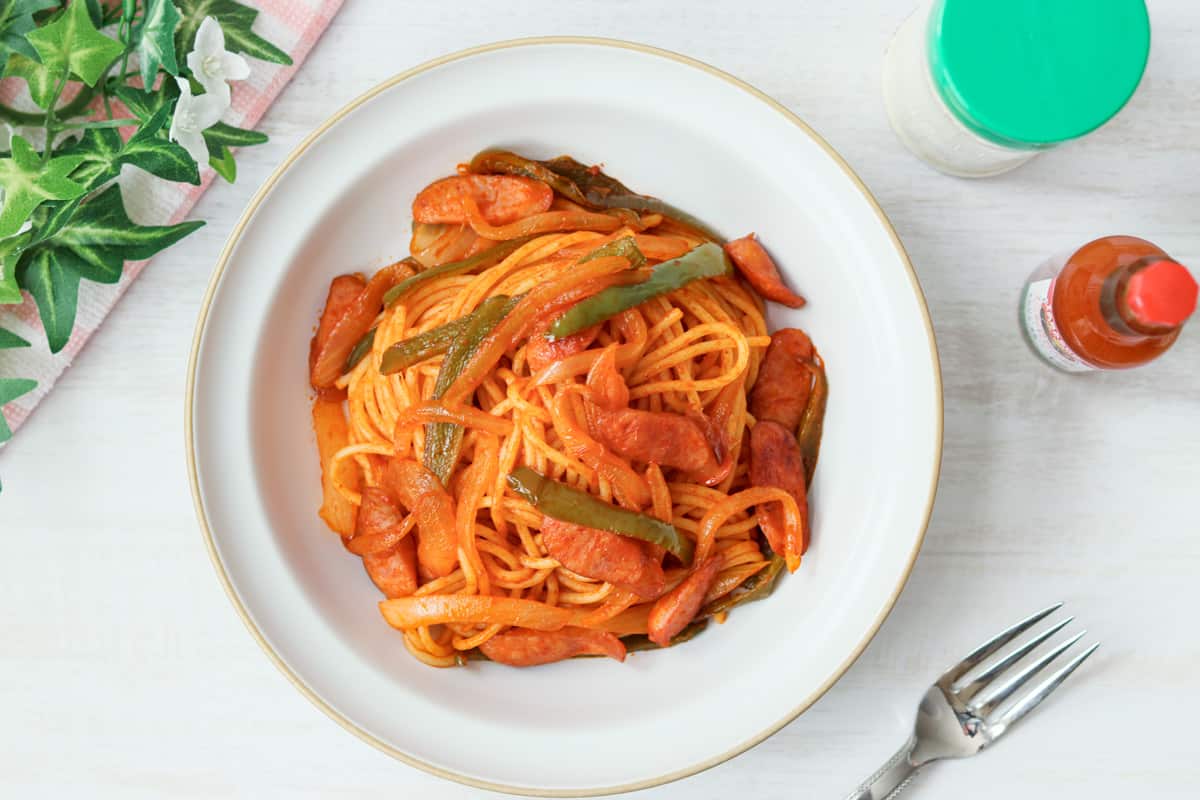
Why soft-spaghetti works best
Currently, spaghetti simply seasoned with ketchup is sometimes referred to as Napolitan, but in its original form, this dish features thicker spaghetti that is boiled slightly longer and seasoned with ketchup. The reason is that authentic Italian cuisine didn't take root in Japan until the 1980s. Japanese people, unfamiliar with the al dente texture of pasta, tended to boil spaghetti until it was soft.
Over time, various Italian pasta dishes like peperoncino, vongole, and carbonara became popular in Japan. Along with this, cooking spaghetti al dente also became mainstream—but when it comes to Napolitan, it is still more common to cook it until soft. This is because softer spaghetti blends better with ketchup and complements the texture of the other ingredients.
There is a general belief that pasta should be cooked al dente, but for Napolitan, softer and chewier spaghetti actually works better. It creates a more balanced dish, so try it with my recipe and see for yourself.
Achieving the authentic flavor and texture
If you would like to achieve the authentic flavor and texture of Napolitan as served in Japanese coffee shops, you might want to try incorporating the following techniques:
• Preparing the spaghetti
In addition to boiling the spaghetti longer until it is soft, rinse it with cold water afterward. This gives it a chewier texture and helps it blend better with the ketchup. Additionally, coating it with oil at this stage will help prevent it from sticking together.
This method was originally developed as a way to shorten the serving time by cooking the spaghetti in advance. So, while it is not absolutely necessary, incorporating it will bring you closer to the authentic Napolitan texture.
• Cooking the ketchup to reduce its acidity
Ketchup has a slightly sour taste, but cooking it reduces the acidity, resulting in a mellower flavor. This plays an important role in shaping the overall taste of the dish.
Napolitan is not an Italian dish, but rather one that was popularized in Japanese coffee shops. Therefore, you might be puzzled by its preparation methods, which differ from typical pasta dishes. However, there is a reason why this dish has become one of the quintessential Japanese-style pasta dishes. Experience authentic Napolitan by following the preparation methods above.
Common ingredients and toppings
Let’s take a moment to talk about the key ingredients commonly used in Napolitan. They include onions, green bell peppers, and sausage, which is typically made from pork. Sausage can also be replaced with bacon or ham.
These ingredients not only add flavor and texture to the dish but also enhance its nutritional value and visual appeal. They are an essential part of Napolitan, so be sure not to leave them out.
Additionally, it is common to sprinkle grated cheese or drizzle Tabasco sauce on top. These are not added during cooking but rather at the table, depending on personal preference. Therefore, I suggest trying the dish as it is first, then adding the toppings to your liking if you want to personalize the flavor.
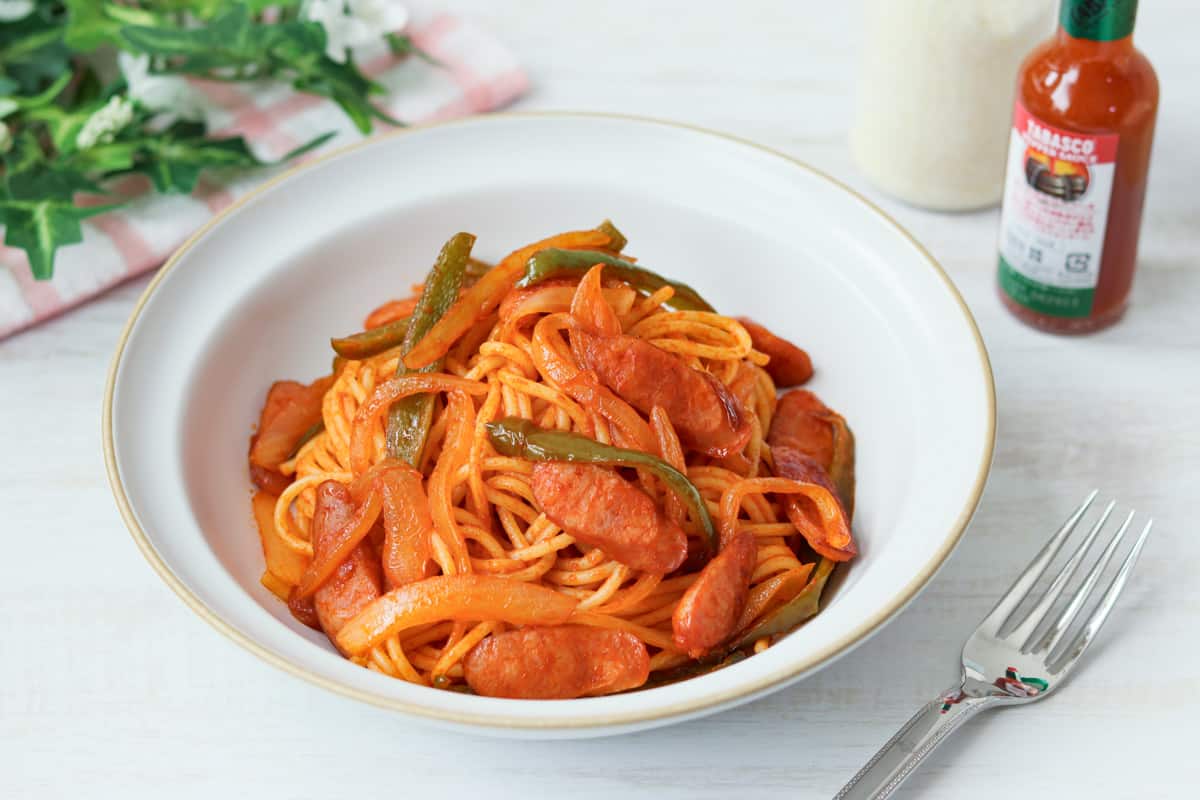
📋Step-by-step recipe
Ingredients
- 3 oz dry spaghetti (1.7mm or thicker)
- ½ Tbsp neutral oil (for the spaghetti)
- 1.8 oz onion
- 1.1 oz green bell pepper
- 2.1 oz sausage (or bacon or ham)
- 2 tsp salted butter (0.17 oz/5 g per 1 tsp)
- 3 ⅔ Tbsp ketchup (0.6 oz/17 g per 1 Tbsp)
- ⅕ cup pasta cooking water (prepared in step 1)
Toppings:
- grated cheese
- Tabasco
Instructions
🕒 Total: 30 mins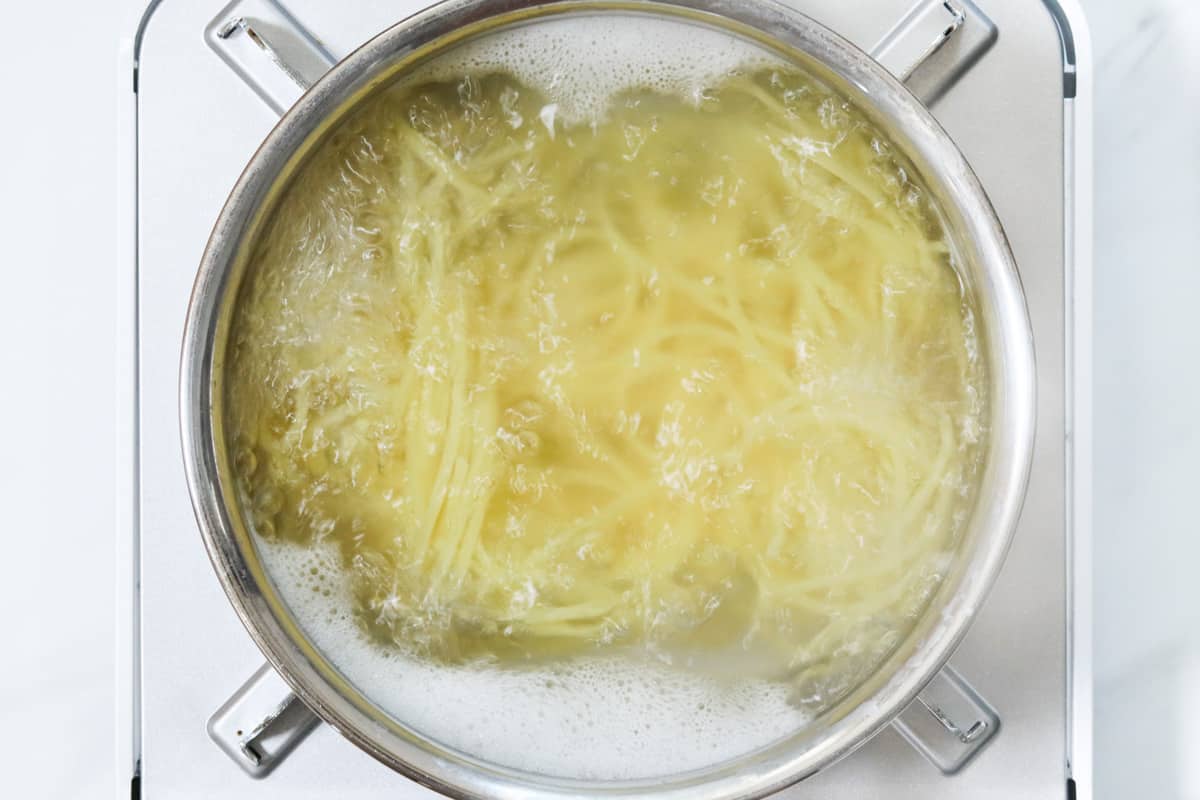
Step 1
Bring a large pot of water to a boil, then add salt (about 1% of the water's volume, not listed in the ingredients) and stir until dissolved. Cook the spaghetti for 2 minutes longer than the package instructions. At this point, reserve ⅕ cup (per serving) of the pasta cooking water for later use.
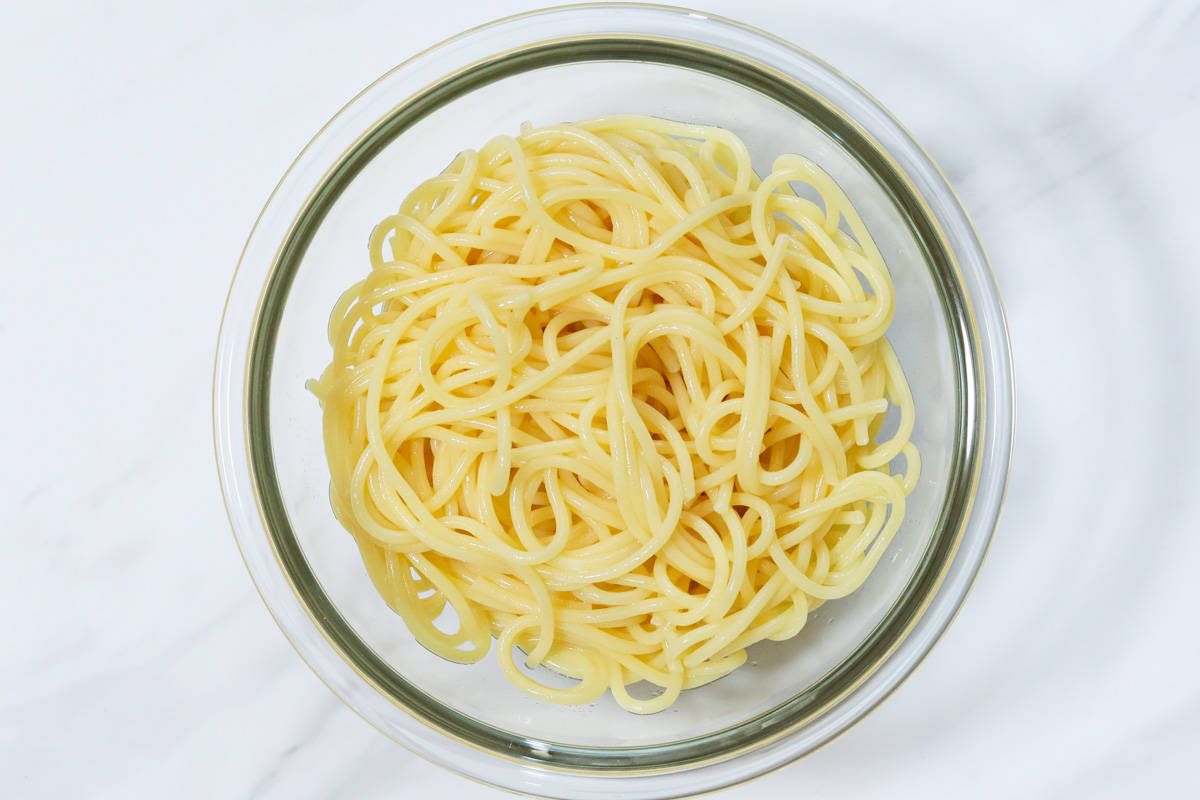
Step 2
Drain the spaghetti in a colander and rinse it under running water to cool and remove excess starch. Once the spaghetti has cooled, drain any excess water, then toss it with oil.
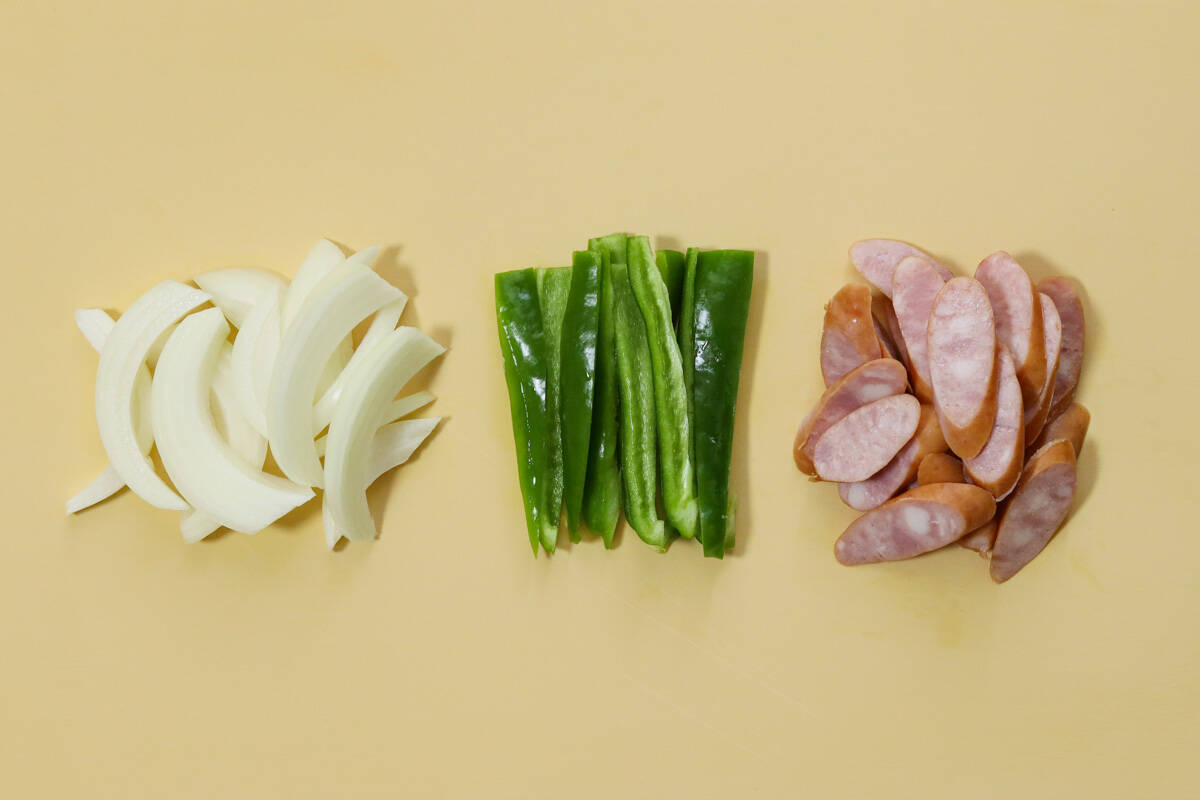
Step 3
Slice the onion and green bell pepper into pieces about ⅕ inch (5 mm) thick. Cut the sausage diagonally into slices about ⅕ inch (5 mm) thick.
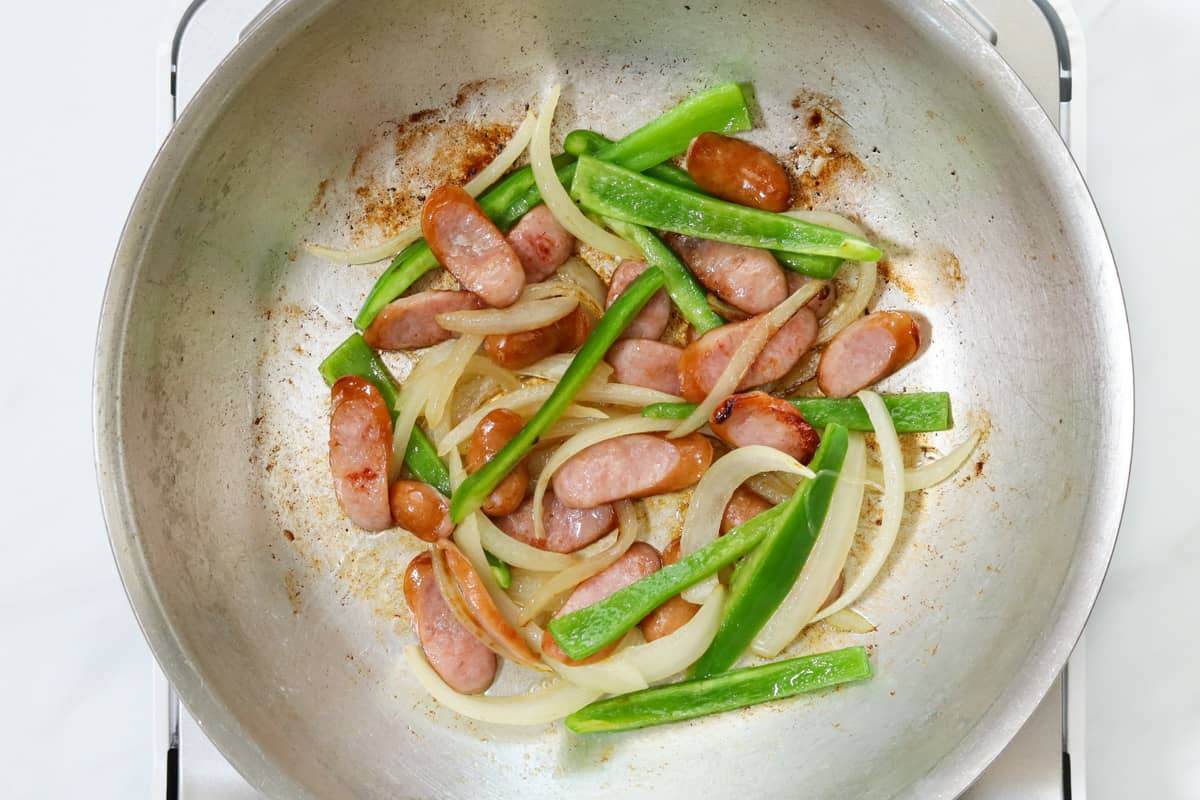
Step 4
Heat butter in a pan over medium heat. Once the butter has melted, add the onions and sauté until translucent. Then, add the sausages and sauté until slightly browned. Finally, add the green bell peppers and sauté until cooked through. (The reason for adding the ingredients at different times is to ensure that each one is cooked just right.)
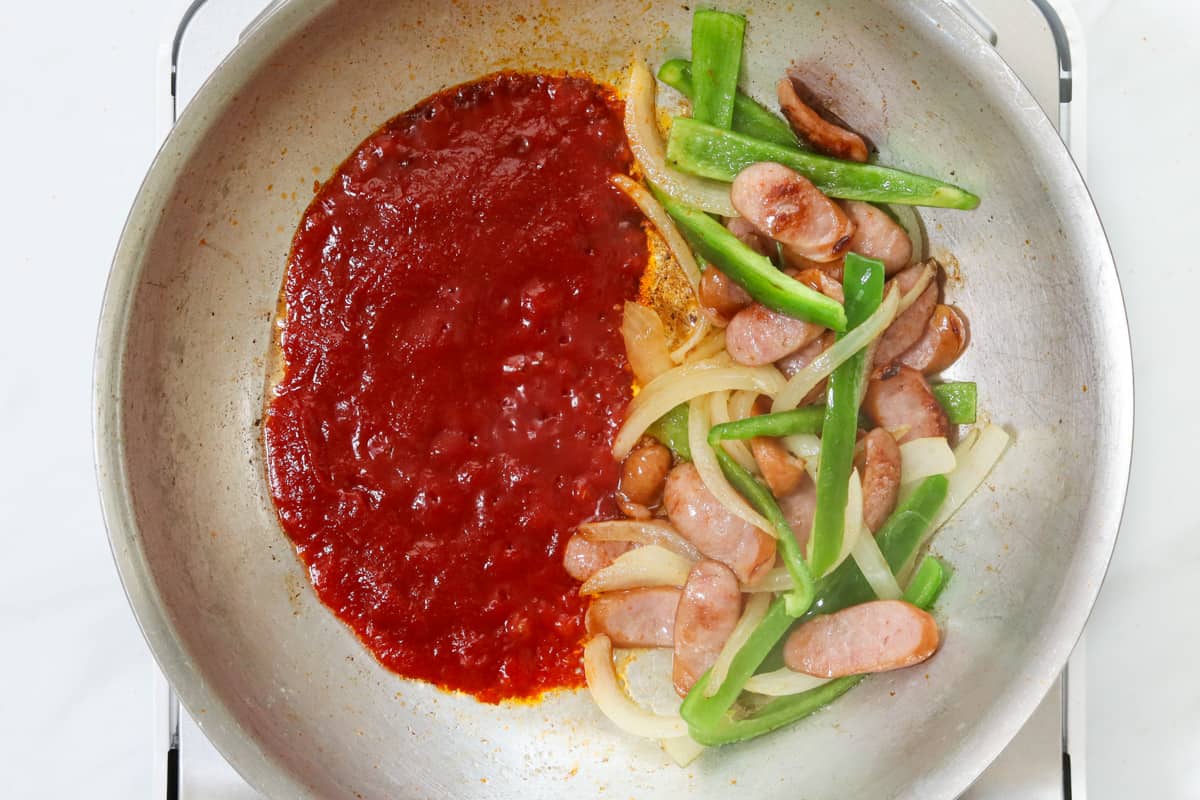
Step 5
Push the ingredients to one side of the pan and add ketchup to the empty space. Cook it for about 1 minute to reduce its acidity.
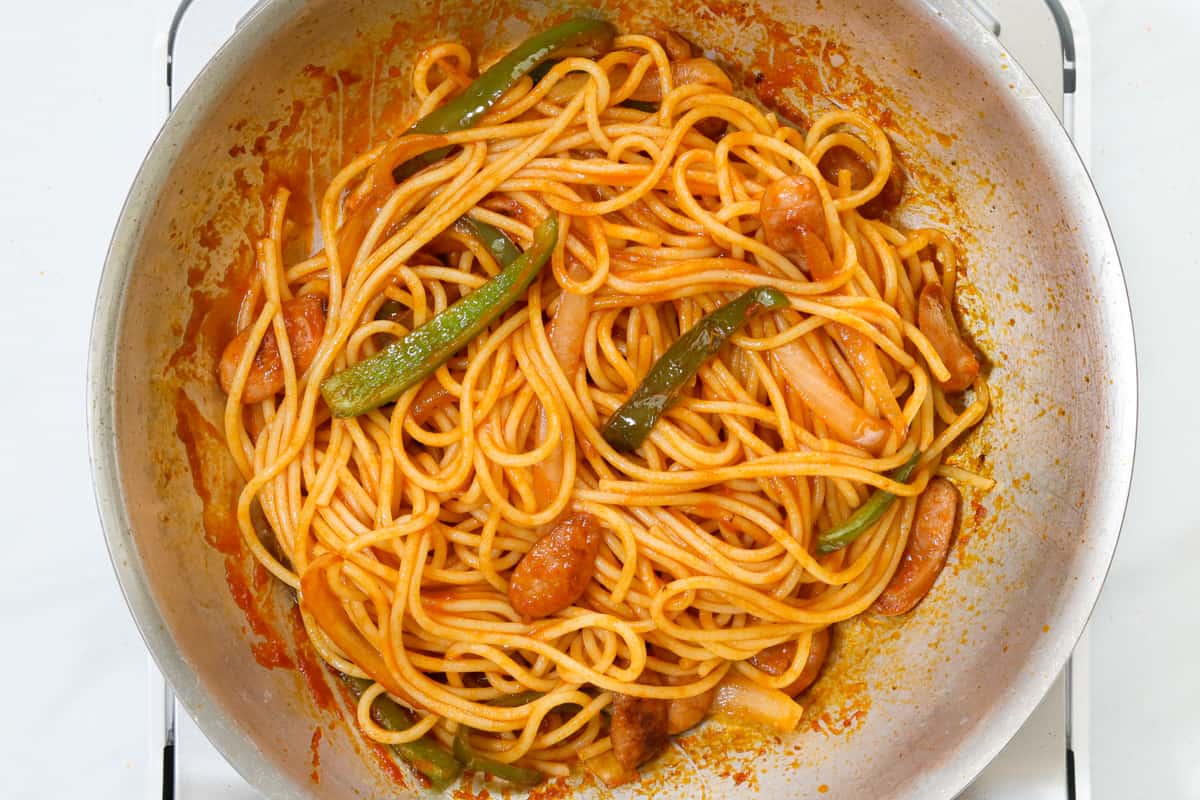
Step 6
Stir the ingredients in the pan with the ketchup. Add the spaghetti to the pan, pour the reserved pasta cooking water over it, and cook until the spaghetti is heated through and the water is absorbed while mixing everything together.
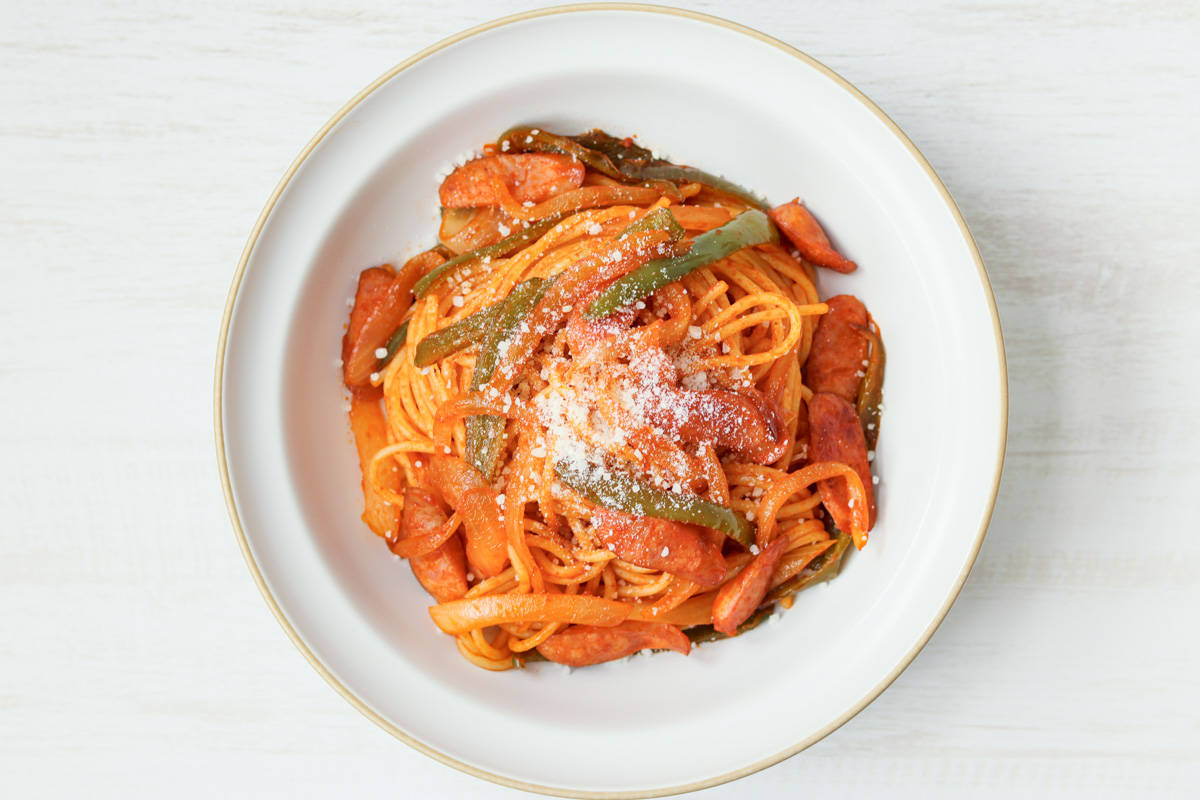
Step 7
Serve on individual plates. Enjoy with grated cheese or Tabasco sprinkled on top, according to personal preference.
To store
You can store it in the refrigerator for up to 2 days.
Cooking tips
- It is best to sauté the ingredients in this order: onions, sausage, and green bell peppers. This is because onions become sweeter and more fragrant when sautéed for a longer time, while bell peppers retain their crunch when cooked for a shorter time.
- Cook the ketchup in a pan before mixing it with the other ingredients. This helps reduce its acidity and creates a mellow flavor. However, if you prefer to keep some of its acidity, cook about 50 to 70% of the ketchup, then add the rest later.
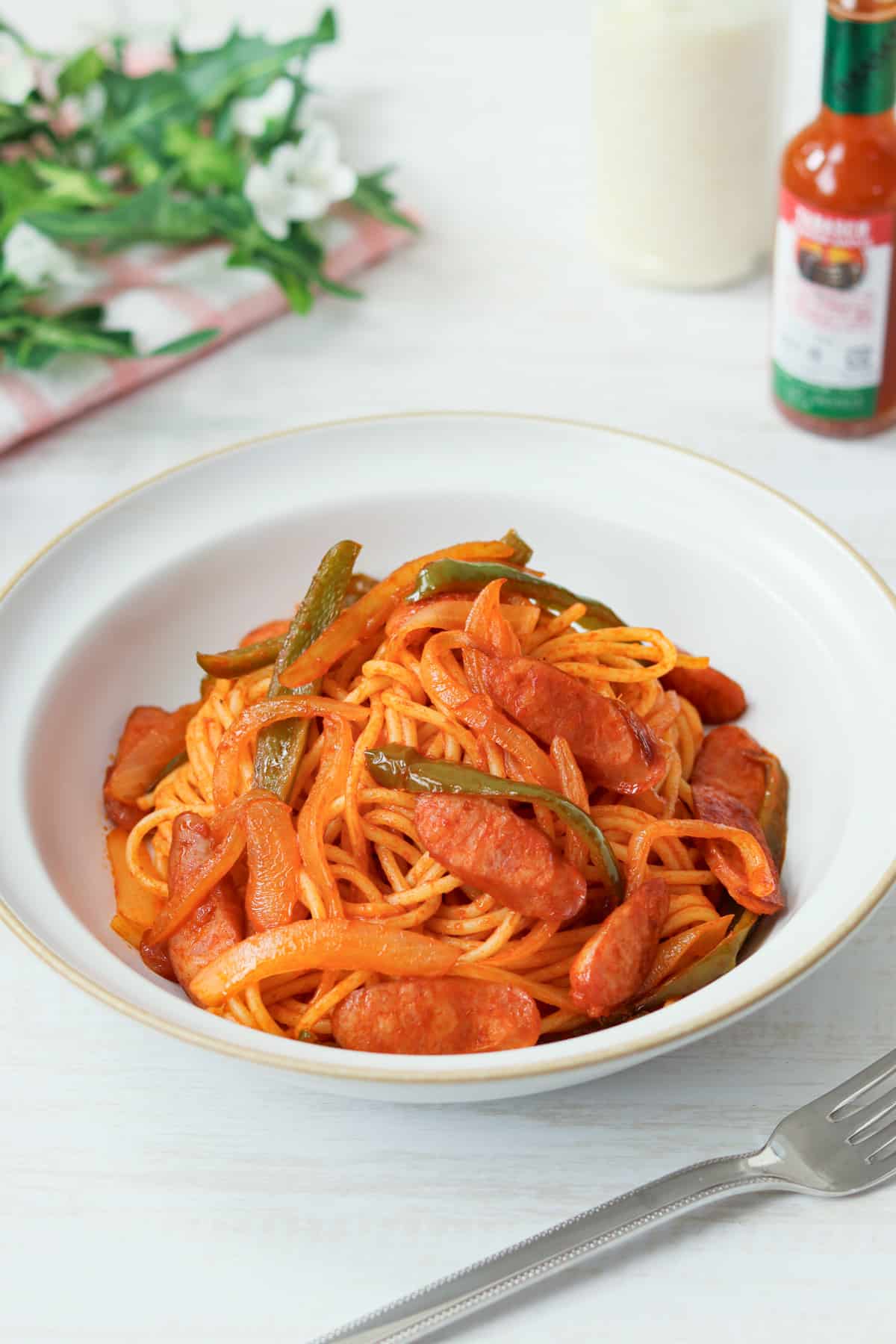
If you try this recipe, I’d love to hear what you think. Please consider leaving a review and star rating in the comments below. If you enjoyed it, I’d really appreciate it if you shared it with your friends.
More Japanese pasta recipes you'll love
Recipe card

Spaghetti Napolitan (Japanese Ketchup Pasta)
Ingredients
- 3 oz dry spaghetti (1.7mm or thicker)
- ½ Tbsp neutral oil (for the spaghetti)
- 1.8 oz onion
- 1.1 oz green bell pepper
- 2.1 oz sausage (or bacon or ham)
- 2 tsp salted butter (0.17 oz/5 g per 1 tsp)
- 3 ⅔ Tbsp ketchup (0.6 oz/17 g per 1 Tbsp)
- ⅕ cup pasta cooking water (prepared in step 1)
Toppings:
- grated cheese
- Tabasco
Instructions
- Bring a large pot of water to a boil, then add salt (about 1% of the water's volume, not listed in the ingredients) and stir until dissolved. Cook the spaghetti for 2 minutes longer than the package instructions. At this point, reserve ⅕ cup (per serving) of the pasta cooking water for later use.
- Drain the spaghetti in a colander and rinse it under running water to cool and remove excess starch. Once the spaghetti has cooled, drain any excess water, then toss it with oil.
- Slice the onion and green bell pepper into pieces about ⅕ inch (5 mm) thick. Cut the sausage diagonally into slices about ⅕ inch (5 mm) thick.
- Heat butter in a pan over medium heat. Once the butter has melted, add the onions and sauté until translucent. Then, add the sausages and sauté until slightly browned. Finally, add the green bell peppers and sauté until cooked through. (The reason for adding the ingredients at different times is to ensure that each one is cooked just right.)
- Push the ingredients to one side of the pan and add ketchup to the empty space. Cook it for about 1 minute to reduce its acidity.
- Stir the ingredients in the pan with the ketchup. Add the spaghetti to the pan, pour the reserved pasta cooking water over it, and cook until the spaghetti is heated through and the water is absorbed while mixing everything together.
- Serve on individual plates. Enjoy with grated cheese or Tabasco sprinkled on top, according to personal preference.
Notes
- You can store it in the refrigerator for up to 2 days.

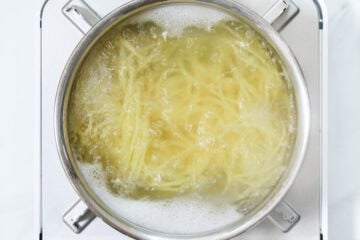
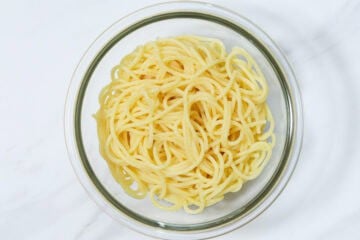
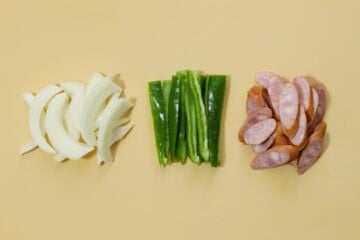

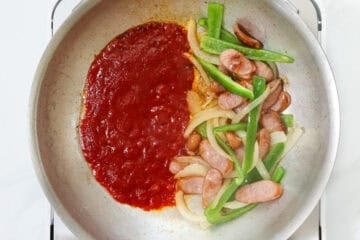
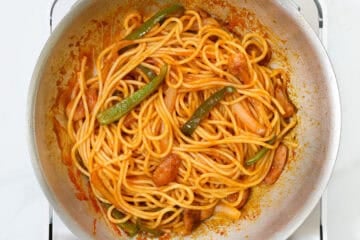

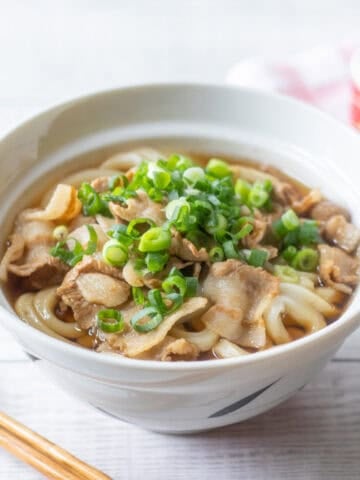
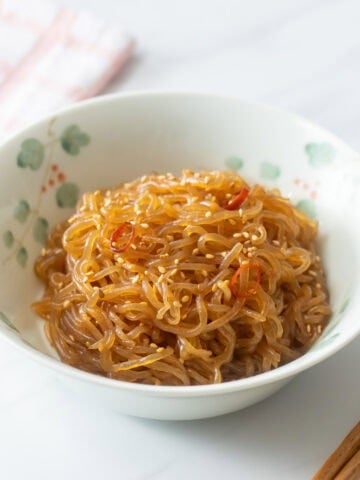
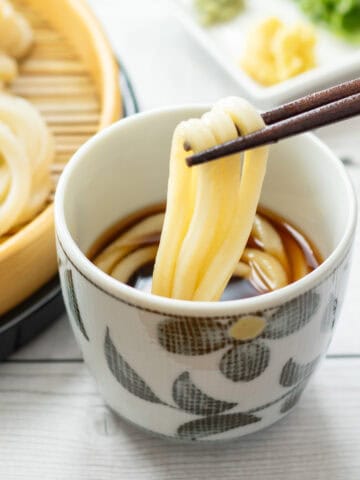
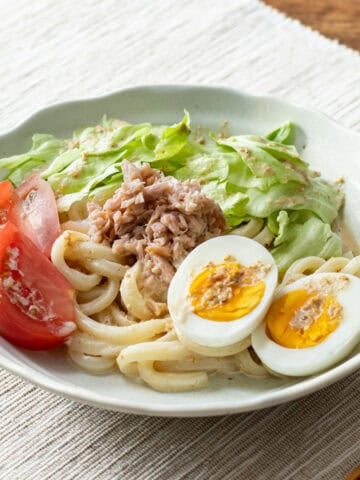
Leave a Rating and a Comment